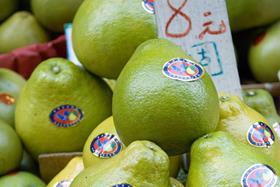
As the season gets underway for this year’s Chinese pomelo season, volumes are predicted to fall 20-30 per cent on last year, with a concomitant rise in fruit size, with the majority falling in the six to eight count range.
Early harvests have started in the Meizhou area in Guangdong Province, although little of this fruit is bound for export markets. The main crop in Pinghe, Guanxi Province, is due to start in several weeks.
“We don’t usually export fruit from this region, as the quality is not as good as pomelos from the Pinghe region,” Sarah McCormack of exporter Dalice Qingdao Trading Company told Fruitnet.com.
“The Pinghe season will start from week 35/36, which is around the same time as last season.”
China’s overall pomelo crop is expected to hit around 600,000 tonnes; the drop compared to last year is partly attributed to rain during the flowering period, according to Vickie Lin of grower-marketer Xiamen Bona. The company itself expects to harvest 20,000 tonnes.
The Chinese domestic market appears to be stable at this point in the season, although demand is expected to go up with the Moon Festival on 22 September and the Chinese National Day on 1 October.
“The prices on the domestic market will probably be reasonably high at the start of the season, but we don’t think this will have any affect on exports,” explained Ms McCormack.
On the export market, Europe is still the major destination.
“Right now Germany is the biggest market, but Eastern Europe is developing very fast,” stated Ms Lin, adding that oversupply could be an issue again this season.
“We just hope there won’t be too many pomelos arriving and causing price fighting. `But` in peak season, we think we will still have an oversupply on the market.”
Early-season, unripe fruit being sent to European markets could also be an issue, although the problem has been getting better in recent seasons.
Demand for early fruit from European buyers means some pomelos enter the market with low sugar and juice levels.
“When ripe fruit arrives, some consumers may hesitate due to the previous `fruit’s` taste, and importers have to dump the early pomelo and pull down the price, which affects the ripe ones,” explained Ms Lin.
Exports to new markets such as Russia are also developing, although payment is a concern in the growing pomelo business there, according to some sources.



